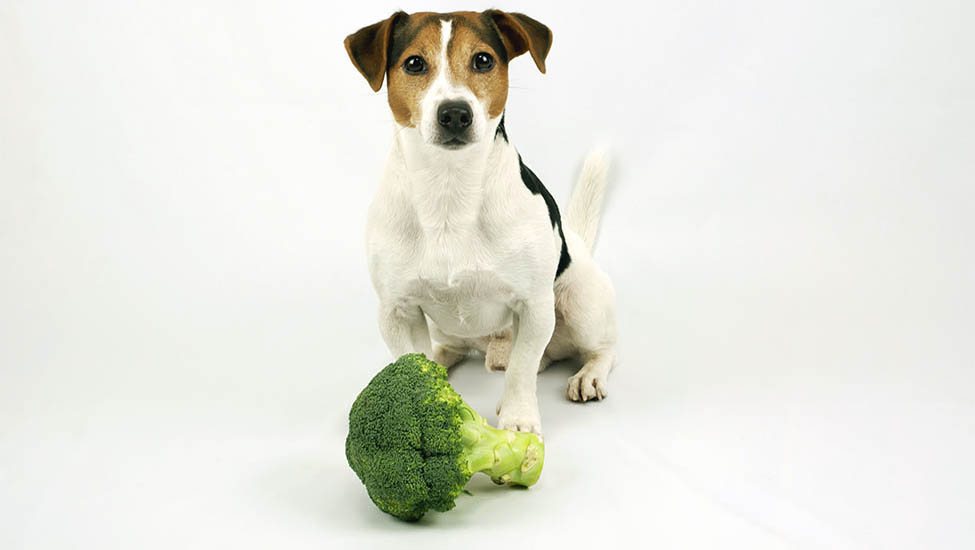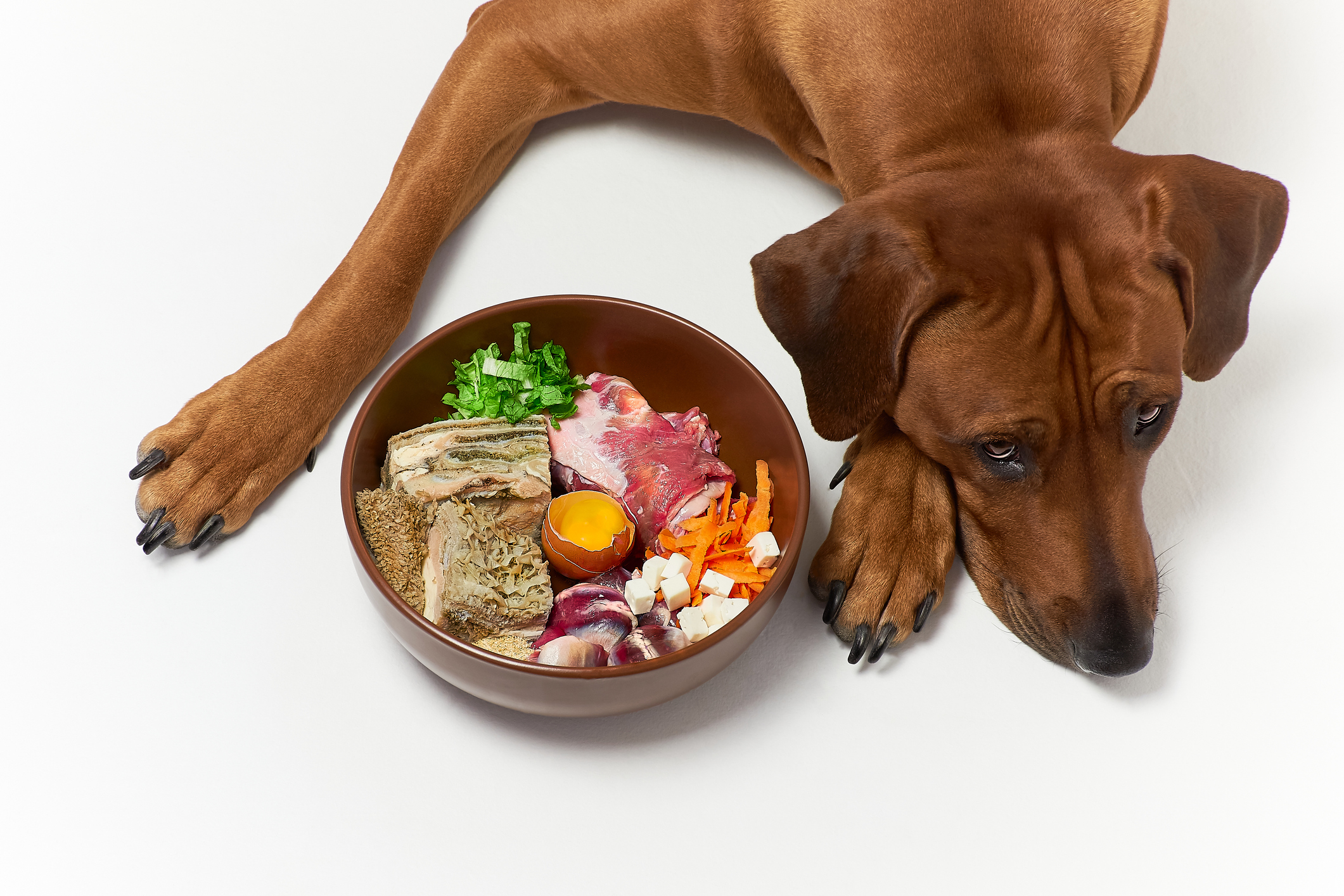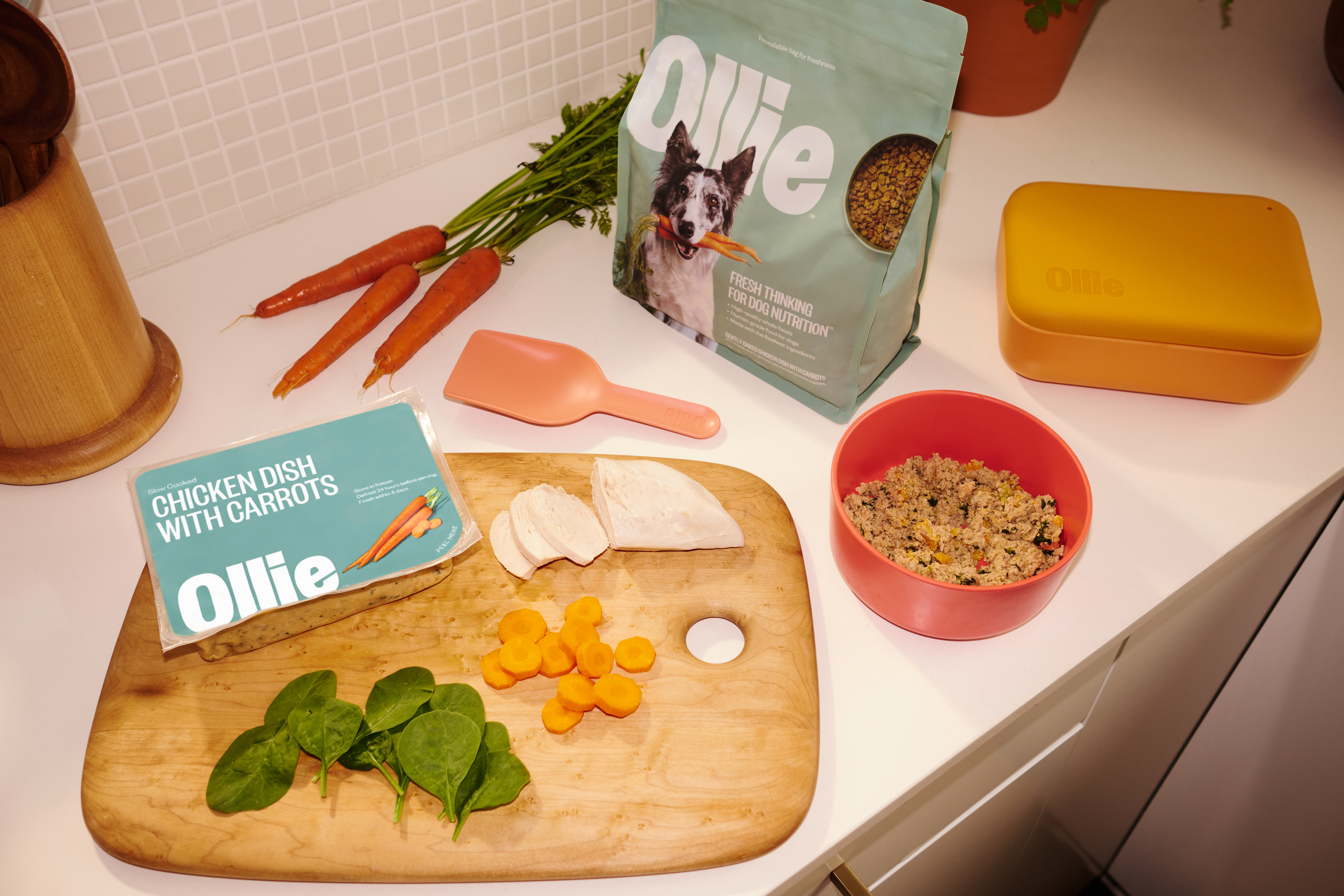Hey Ollie blog readers! We’re offering you an exclusive 60% OFF your starter box! Try now!
Dog food brands often use vibrant images of fresh meat, produce, or whole grains to convey health and nutrition, enticing owners to make a purchase. Pet foods often cater to owner interests by aligning with human nutrition trends. This has resulted in the introduction of limited ingredient dog foods due to the popularity of grain-free diets and keto-friendly formulas. Limited ingredient diets are often marketed for dogs with allergies or digestive sensitivities as they contain fewer ingredients, making them gentler on a pet’s system and reducing the likelihood of triggering a reaction.
However, is a limited ingredient dog food the best choice for your dog? To help shed light on this latest dog food phenomenon, we turned to Nancy Welborn. DVM, a veterinarian and assistant professor at Louisiana State University’s School of Veterinary Medicine, and to Gary Weitzman, DVM, MPH, CAWA, President and CEO of the San Diego Humane Society and author of The Complete Guide to Pet Health, Behavior, and Happiness.
What Makes Limited Ingredient Dog Food Different?
Limited ingredient dog foods typically contain one protein source, often a less common meat such as duck or kangaroo, and a single carbohydrate such as corn or potato. However, some kibble brands market themselves as limited ingredient dog foods simply because they contain fewer additives than others. Deciphering dog food labels is crucial for making the best choice and providing your dog with optimal nutrition.
Does My Dog Need a Limited Ingredient Dog Food?
Suspected food allergies are the primary reason why owners consider or select a limited ingredient food for their dog. However, Dr. Weitzman warns against making food allergy assumptions without a veterinary diagnosis. “A very small percentage of dogs actually have food allergies,” says Dr. Weitzman. Although a limited ingredient dog food may not worsen your dog’s issues, incorrectly assuming your dog has allergies can delay proper treatment for frustrating signs such as “horrible skin or gastrointestinal issues,” he says.
Dogs with Food Allergies
For dogs with veterinarian-confirmed food allergies, a limited ingredient diet is a key part of long-term symptom management. Dr. Weitzman says, “Limited ingredient diets can be really helpful for the small percentage of dogs who have [true] food allergies.”
Standard allergen-containing dog food can trigger allergic reactions in dogs, leading to troublesome inflammatory responses in the digestive or dermatologic systems with each meal. However, properly selected limited ingredient diets are non irritating and allow your pup to receive maximum nutrition without experiencing digestive or dermatologic discomfort.
Determining safe ingredients for your pup’s digestion can be a lengthy trial-and-error process, potentially delaying their recovery and depriving them of adequate nutrition. Allergy diagnosis and management require veterinary testing, treatment, and close monitoring. Consult your dog’s veterinarian for suspected food allergies.
Common Dog Food Allergies
Dogs with Sensitive Stomachs
Unlike food allergies, food sensitivities do not involve the immune system. The digestive system’s inability to break down and process certain ingredients causes a food sensitivity.
Signs your dog has a food sensitivity:
- regurgitation
- vomiting
- bloating
- inconsistent stools
- gas
Limited ingredient diets can be extremely helpful for these dogs as long as the food does not contain the triggering ingredient(s). Talk to your veterinarian if you’re concerned about your pup’s tender tummy. Additional interventions, such as probiotics, medications, stress-reduction, and regular exercise, can play a critical role in successful long-term management.
Best Food for Dogs with Sensitive Stomachs
Risks of Limited Ingredient Dog Food
Like any other specialty diet, “if owners begin feeding these foods without veterinary recommendation, they are exposing the pets to multiple protein and/or grain sources, which may cause problems down the road,” explains Dr. Welborn. The best way to determine if your dog has allergies is to schedule a visit with your veterinarian.
After performing your pup’s full physical examination and reviewing their food history, your veterinarian may recommend an elimination diet in which many ingredients have been removed. To identify your dog’s specific allergy triggers, each ingredient is gradually reintroduced.
Being on a limited ingredient diet doesn’t necessarily mean that you’re feeding your dog a better diet. The key, Dr. Welborn says, is to assess the food’s protein, vitamin, and mineral levels, ensuring they’re balanced, complete, and made from high-quality ingredients.
Putting your dog on a strict diet without a good medical reason could put their health at risk. Over time, highly restrictive or nontraditional diets can create dangerous nutritional deficiencies. Perhaps the most notable example of this is canine dilated cardiomyopathy (DCM).
In July 2018, the U.S. Food and Drug Administration (FDA) announced that the organization had begun assessing DCM reports about dogs eating certain pet foods, many labeled as being grain-free. These foods contained a high proportion of peas, lentils, other legume seeds (i.e., pulses), and/or potatoes in various forms (e.g., whole, flour, protein) as their main ingredients, which were presented within the first 10 ingredients in the ingredient list, before vitamins and minerals. The FDA investigation primarily focused on boutique, exotic, and grain-free (BEG) diets. Unfortunately, many limited ingredient dog foods are classified as being BEG. Therefore, you should discuss a potential diet with your veterinarian before switching your dog.
How to Transition Your Dog’s Food According to a Vet
Avoid These Harmful Dog Food Ingredients
At Ollie, we emphasize the importance of fresh, whole-food ingredients in our recipes. However, it’s crucial to be aware of common dog food ingredients that should never be served to your pup due to their potential harm or toxicity. Regardless of the type of diet you choose, avoid these ingredients:
- Artificial ingredients — Food colorings or dyes, synthetic vitamins and minerals, and artificial flavor enhancers provide your dog with little to no nutritional value and may contribute to allergies.
- Fillers — Filler ingredients add bulk to dog food recipes but provide poor nutritional value for dogs. Many fillers are also inflammatory and can harm your pup’s overall health. Avoid fillers, such as corn, corn meal, soy, wheat, and soybean hulls, especially if they’re featured in the first five ingredients.
- Harmful preservatives — Synthetic preservatives can harm your pet’s digestion and cause cumulative damage to their organs and immune system. Avoid products containing propylene glycol, ethoxyquin, and butylated hydroxyanisole (BHA), and butylated hydroxytoluene (BHT).
Tired of reading the fine print? Check out our article on how to read and understand dog food labels.
How to Choose a Limited Ingredient Dog Food
For some dogs, a limited ingredient diet is the solution to their problems. But, by definition, a limited ingredient diet doesn’t necessarily equate to a more nutritious diet, Dr. Welborn says. Remember when everyone switched to a gluten-free diet, including people who weren’t gluten-intolerant? Often, your dog may receive many of the same benefits attributable to a limited ingredient diet (e.g., better digestion, fewer allergies, more energy) when you feed them an unprocessed dog food with high-quality, not necessarily limited, ingredients.
Whole Food Diets are Best for Long-Term Nutritional Health
Our Ollie team strives to create a diet that is both delicious and nutritious, because our veterinary nutritionists keep up with the latest research to ensure our food is safe and healthy for your dog. Although our fresh and gently cooked recipes are not considered limited ingredient diets, we believe in using as few ingredients as possible to provide your pup with tailored nutrition. We carefully select human-grade proteins, including chicken, lamb, turkey and beef. These proteins are then carefully blended with fruit, vegetables, and superfoods, such as flaxseed and cod liver oil when appropriate, to create a complete and balanced meal for your dog.
Because our fresh dog food is made with a single animal protein source, they can be a safe option for dogs with food allergies. If your pup is allergic to chicken, a common canine food allergen, they can still enjoy our beef, turkey, or lamb recipes.
When choosing your dog’s food, ingredient quality and quantity matter. Whether you select a limited or traditional ingredient diet, one thing is certain: Ollie’s fresh, balanced diets can transform your dog’s health. Research shows that dog foods, such as Ollie, help pups enjoy better sleep, healthier skin and coat, and a longer life. If you are searching for a whole-food diet, ensure that it is included in the Association of American Feed Control Officials (AAFCO) Dog Food Nutrient Profiles for All Life Stages, like all of Ollie’s recipes.
Tagged As:

The nutrition your dog needs,
the food they want.

Enjoying our articles? Subscribe our Newsletters and get new articles directly to your inbox
You might also like
3 July 2025
5 MINS READ
How Fresh Food Can Help Your Dog Have Perfect Poops
As a pup parent, you’re likely very familiar with your dog’s bathroom habits. While it may not be the most glamorous part of taking care of your pup, a dog’s stool can be one of the most dir…
by Ollie Pets
3 July 2025
5 MINS READ
Understanding the Risks of Raw Dog Food
When it comes to choosing the right diet for your dog, understanding the full picture is crucial for making an informed decision. In this article, we’ll dig deeper into what defines a raw diet, …
by Ollie Pets
3 July 2025
4 MINS READ
Understanding a Balanced Diet for Your Dog
As a dedicated pet parent, you want to provide the best for your dog, and that starts with their food bowl. We all understand the basics of a balanced diet for ourselves, but what does that look l…
by Ollie Pets







